|
|
|
Sort Order |
|
|
|
Items / Page
|
|
|
|
|
|
|
| Srl | Item |
| 1 |
ID:
139247


|
|
|
|
|
| Summary/Abstract |
The settlers constitute a minority group whose goals are becoming increasingly unpopular among Israelis. As a result, the degree of legitimacy granted to them by the government gradually eroded over the years. However, their project still thrives. Their impressive success can be attributed to their focus on the bureaucracy. As early as the 1960s, the settlers engaged in a constant effort to identify actors in state and semi-state agencies that had common interests with them. At first they mobilized supporters from within those agencies. Later they made any effort to fill available positions with their own people. Today, the settlers' movement in Israel has fused itself with the relevant elements within the bureaucracy to a degree that many state agencies serve as extensions of the settler movement.
|
|
|
|
|
|
|
|
|
|
|
|
|
|
|
|
| 2 |
ID:
168320
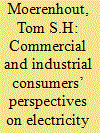

|
|
|
|
|
| Summary/Abstract |
This paper investigates the perspectives of commercial and industrial consumers on electricity pricing reform in Uttar Pradesh, India. In a first study of its kind, we report results from semi-structured, in-depth interviews that were conducted with a variety of firms, based on their electricity price dependence and employment. Results show that senior management officials already strongly oppose cross-subsidy policies in which they pay higher tariffs to reduce prices for households and farmers. Firms also have very few available coping mechanisms to deal with further electricity tariff rises. Senior management officials believe their firms will have to compromise on electricity usage if prices are increased again. Available models suggest that this will likely be a cause for lowering output and overall machine and labor productivity. While firms do expect price rises in the short term, they believe this will impact their productivity and have a low opinion of the state government. This might be aggravated by little knowledge about the price setting mechanism, their means of participation and the level of utility dependence on state subsidies.
|
|
|
|
|
|
|
|
|
|
|
|
|
|
|
|
| 3 |
ID:
163914
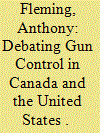

|
|
|
|
|
| Summary/Abstract |
The weakness of the antigun lobby in the United States is attributed to the “collective action problem” of trying to mobilize “free riders” behind a public purpose. But the Coalition for Gun Control emerged in Canada to successfully lobby for the Firearms Act of 1995. If the “collective action problem” is not limited to the United States, then are its effects “mediated” by political culture? To address this research question, we content analyze (1) media coverage, (2) party platforms, (3) presidential, and (4) ministerial rhetoric. Three frames represent “restrictive” gun policies that ban or regulate firearms, “punitive” gun policies that penalize the person for the unlawful use of firearms, or “lenient” gun policies that encourage gun ownership and gun rights. Marked differences in framing the gun debate help explain why an antigun coalition emerged in Canada but not the United States.
|
|
|
|
|
|
|
|
|
|
|
|
|
|
|
|
| 4 |
ID:
132529
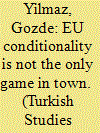

|
|
|
|
|
| Publication |
2014.
|
| Summary/Abstract |
Despite the weakened push by the European Union (EU) conditionality across time, Turkey's Europeanization process continues in a number of areas selectively. Focusing on such a puzzling trend, this article critically examines the role of EU conditionality on Turkey's Europeanization and unpacks domestic drivers of change. The article explores the impact of grassroots actors ?Turkish civil society organizations, business interest groups, media and political parties? on domestic change in the last decade and argues that continuing reforms in many areas in an era of limited EU-push are influenced by domestic actors.
|
|
|
|
|
|
|
|
|
|
|
|
|
|
|
|
| 5 |
ID:
108356
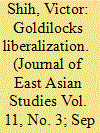

|
|
|
|
|
| Publication |
2011.
|
| Summary/Abstract |
Nearly two decades after central bankers began to call for interest rate liberalization, the central bank continues to impose stringent rules on the fluctuation of deposit interest rates. This seems an unlikely outcome given widespread endorsement of liberalization by technocrats and experts both in and out of the government, China's accession to the World Trade Organization, and the technocrats' insulation from popular pressure. To be sure, local interests and central bank lobbying have driven gradual liberalization of interest rates. However, senior Chinese technocrats held on to control over interest rates because of their need to maintain state banks' dominance and to mobilize bank funds in times of economic downturns. As such, progress toward interest rate liberalization only to ok place during "Goldilocks" phases when the economy enjoyed healthy growth without high inflation.
|
|
|
|
|
|
|
|
|
|
|
|
|
|
|
|
| 6 |
ID:
120140
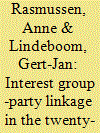

|
|
|
|
|
| Publication |
2013.
|
| Summary/Abstract |
This article systematically investigates interest group-party interactions in the Netherlands, Denmark and the United Kingdom based on cross-national surveys with responses from 1,225 interest groups. The findings show that interest groups and parties still interact in the beginning of the twenty-first century, but that the vast majority of their interaction involves a low degree of institutionalisation. Using fractional logit analysis, it is demonstrated that the strength of interest group-party linkage is primarily affected by systematic differences in state-society structures and organisational group characteristics. Moreover, differences are found in what conditions different types of interaction. Whereas historical legacies and partisan origin influence an interest group's structural party links, group resources make interactions of a less institutionalised, ad hoc nature more likely.
|
|
|
|
|
|
|
|
|
|
|
|
|
|
|
|
| 7 |
ID:
082210
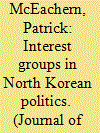

|
|
|
|
|
| Publication |
2008.
|
| Summary/Abstract |
North Korea is often characterized as some form of highly centralized rule: totalitarian, posttotalitarian, corporatist, or personalistic. This article argues that much of the confusion around understanding North Korea's actions stems from misplaced models. Much of the current thinking on North Korea's politics does not account for the limited institutional plurality in the system. The article documents how the state's political institutions have changed since the country's founding and highlights the formal and informal roles of each major bureaucracy today. The Korean Workers Party and the role of Juche have declined, but the National Defense Commission and "military-first politics" have not taken their place as reigning supreme. Rather the interaction between the Korean Workers Party, military, and cabinet helps explain and moderate policy outcomes
|
|
|
|
|
|
|
|
|
|
|
|
|
|
|
|
| 8 |
ID:
112790
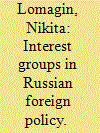

|
|
|
|
|
| Publication |
2012.
|
| Summary/Abstract |
Among the domestic interest groups that play a role in influencing Russian foreign policy the Russian Orthodox Church has become an important actor. Its most important role has been that of supporting the emergence of a new nationalist Russian identity to undergird Russian policy. On specific policy issues, it has advocated the political reunification of Eastern Slavic Orthodox peoples, the emergence of a multipolar international system and the restatement of traditional values as the foundation for the pursuit of global human rights.
|
|
|
|
|
|
|
|
|
|
|
|
|
|
|
|
| 9 |
ID:
111502
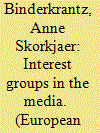

|
|
|
|
|
| Publication |
2012.
|
| Summary/Abstract |
A prominent presence in the news media is important for interest groups. This article investigates the development in the diversity of interest group media attention over time. The analysis draws on a dataset of 19,000 group appearances in the Danish news media in the period 1984-2003. It demonstrates how diversity has risen continually over time, leading to a media agenda less dominated by labour and business and more by public interest groups and sectional groups. This development is related to the increasing political importance of the news media and the decline in group integration in public decision-making processes. The article also shows how the development of group appearances is closely related to changes in media attention towards different policy areas.
|
|
|
|
|
|
|
|
|
|
|
|
|
|
|
|
| 10 |
ID:
170304
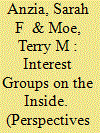

|
|
|
|
|
| Summary/Abstract |
New scholarship in American politics argues that interest groups should be brought back to the center of the field. We attempt to further that agenda by exploring an aspect of group influence that has been little studied: the role interest groups play on the inside of government as official participants in bureaucratic decision-making. The challenges for research are formidable, but a fuller understanding of group influence in American politics requires that they be taken on. Here we carry out an exploratory analysis that focuses on the bureaucratic boards that govern public pensions. These are governance structures of enormous financial consequence for state governments, public workers, and taxpayers. They also make decisions that are quantitative (and comparable) in nature, and they usually grant official policymaking authority to a key interest group: public employees and their unions. Our analysis suggests that these “interest groups on the inside” do have influence—in ways that weaken effective government. Going forward, scholars should devote greater attention to how insider roles vary across agencies and groups, how groups exercise influence in these ways, how different governance structures shape their policy effects, and what it all means for our understanding of interest groups in American politics.
|
|
|
|
|
|
|
|
|
|
|
|
|
|
|
|
| 11 |
ID:
096263
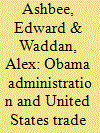

|
|
|
|
|
| Publication |
2010.
|
| Summary/Abstract |
For all the focus on economic issues in the wake of the crisis of 2008 the Obama administration has remained ambiguous about a central component of economic policy. As both candidate and President, Obama has sent mixed messages about trade policy. This ambiguity reflects wider uncertainty within the Democratic Party about global trading relationships and this paper explores and assesses the reasons for this uncertainty. A large part of the answer lies in the disparate sources of support for the Democrats. That is, the party has courted support from interest groups and core groups of voters that have widely divergent views about the value of trade liberalisation.
|
|
|
|
|
|
|
|
|
|
|
|
|
|
|
|
| 12 |
ID:
141190
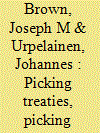

|
|
|
|
|
| Summary/Abstract |
International treaty negotiations and domestic politics are interrelated. We show that negotiators can strategically select treaties to mobilize domestic interest groups and support particular candidates for office. Interest groups will support (oppose) political parties that will ratify treaties benefiting (harming) them. By designing treaties that mobilize these “swing” groups, negotiators can affect different parties’ chances of assuming power. Our model produces specific predictions for treaty design, contingent on the preferences of negotiators, parties, and interest groups. With conservative and moderate interest groups, the results may be counterintuitive—for instance, foreign governments pushing liberal treaties on liberal incumbents they dislike, intentionally mobilizing interest groups against the treaty and in favor of conservative challengers. Highly competitive systems, particularly those where moderate interest groups’ support is in play, give treaty negotiators leeway to shape political outcomes. Powerful interest groups may exert strong influence or no influence, depending on the cost of appeasing them and whether domestic and foreign negotiators are willing to gamble the incumbent’s political future for the achievement of their policy ideals.
|
|
|
|
|
|
|
|
|
|
|
|
|
|
|
|
| 13 |
ID:
163913
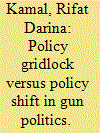

|
|
|
|
|
| Summary/Abstract |
Why do major events of gun violence (i.e., mass shootings) lead to incremental change or no federal legislative change at all in the United States while major events of gun violence have resulted in large-scale legislative changes in Canada? Exploring the complexities involved in this compelling question, this article conducts a comparative analysis of recent gun control policy gridlock and shift in these two countries. We concentrate on two mass shooting cases in each country: the Columbine (1990) and Sandy Hook (2012) massacres in the United States and the École Polytechnique Massacre (1989) and Concordia Shooting (1992) in Canada. We use veto player theory to gain insights into why tightening gun policy is so difficult to implement in the United States while Canada often follows up with policy transformations after a focusing event. This theory informs the central argument that the key factors underpinning the divergent policy outcomes on gun control issues in both countries involve differences in the structure of government/institutional design and the role and power of interest groups in each case.
|
|
|
|
|
|
|
|
|
|
|
|
|
|
|
|
| 14 |
ID:
160869
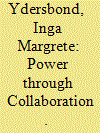

|
|
|
|
|
| Summary/Abstract |
Who gets what in high-level European Union (EU) negotiations and how? This study draws on data concerning stakeholder preferences during heated negotiations leading to the EU’s 2030 Climate and Energy Policy Framework. It tests the explanatory values of Liberal Intergovernmentalism (LI), the Advocacy Coalition Framework (ACF), and Historical Institutionalism (HI). Large member states were key (LI). However, coordinated groups of member states, bound by specific common interests, also played crucial roles. ACF explains the 2030 Framework only if: a) the decisive coalitions consisted of the EU’s supranational institutions, the coordinated groups of member states and long-term advocacy coalitions in the interest group community; b) coalition members held comparatively similar views; and c) coalition members adjusted their strategies mutually and/or shared information. The European Commission set the agenda (HI). The analysis demonstrates that LI, HI and ACF may be used as complementary analytical tools, filling several of each other’s gaps.
|
|
|
|
|
|
|
|
|
|
|
|
|
|
|
|
| 15 |
ID:
116670
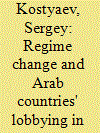

|
|
|
|
|
| Publication |
2013.
|
| Summary/Abstract |
In this article lobbying by several Arab countries in the United States is analyzed to answer two questions: What are the ramifications of a regime change for lobbying strategy in the United States? Does lobbying matter in securing US government support? First, the study demonstrates that regime change in Tunisia, Egypt and Libya has had no effect on their lobbying in the United States so far. The analysis of lobbying by countries which eschewed regime change-Bahrain, Saudi Arabia, and Pakistan-surprisingly comes to the same conclusion. Second, the ability of troubled regimes to peacefully control their own populace is more important for securing US support than lobbying.
|
|
|
|
|
|
|
|
|
|
|
|
|
|
|
|
| 16 |
ID:
129047
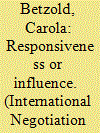

|
|
|
|
|
| Publication |
2014.
|
| Summary/Abstract |
This article analyzes the lobbying behavior of nongovernmental organizations (ngos) during international climate change negotiations.2 With limited resources, these ngos need to strategically invest their resources to maximize impact. A key decision concerns the target of lobbying efforts: Whom do ngos lobby, and why? Two possible explanations are contrasted: influence and responsiveness. Accordingly, ngos can focus on responsive targets that are likely to bring ngo input to the table or they can focus on influential targets whose voice is heard at the negotiation table. These two explanations are tested using data from a survey of ngos active in international climate change negotiations. I find that ngos strategically target their lobbying efforts, approaching both responsive and, more importantly, influential delegations. However, given that ngos primarily contact their home delegation, as well as the president of the negotiation session, further information on the nature and content of contacts between ngos and government delegations is necessary for understanding ngo-government interactions in international climate change negotiations.
|
|
|
|
|
|
|
|
|
|
|
|
|
|
|
|
| 17 |
ID:
138878
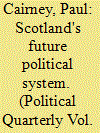

|
|
|
|
|
| Summary/Abstract |
Debates on Scottish constitutional reform go hand in hand with discussions of political reform. Its reformers use the image of ‘old Westminster’ to describe ‘control freakery’ within government and an adversarial political system. Many thought that the Scottish political system could diverge from the UK, to strengthen the parliamentary system, introduce consensus politics and further Scotland's alleged social and democratic tradition. Yet the experience of devolution suggests that Holyrood and Westminster politics share key features. Both systems are driven by government, making policy in ‘communities’ involving interest groups and governing bodies, with parliaments performing a limited role and public participation limited largely to elections. The Scottish government's style of policy-making is distinctive, but new reforms are in their infancy and their effects have not been examined in depth. In this context, the article identifies Scotland's ability to make and implement policy in a new way, based on its current trajectory rather than the hopes of reformers.
|
|
|
|
|
|
|
|
|
|
|
|
|
|
|
|
| 18 |
ID:
117291
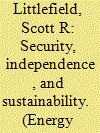

|
|
|
|
|
| Publication |
2013.
|
| Summary/Abstract |
This article examines the impact of imprecise terminology on the energy policymaking process in US, focusing on the manipulation of discourse by different political-economic interests seeking to sway popular opinion. Using the 2012 US Presidential Elections as a backdrop, the analysis highlights the cooption of the concepts "security," "independence," and "sustainability" in energy debates by different and often opposing interest groups. The article's first section traces the malleability of energy terminology to the vagueness of the term "energy" itself and notes how qualifying words like security, independence, and sustainability have been selectively exploited to introduce further ambiguity to an already fungible concept. The second section notes that while energy is a critical and complex factor of macroeconomic production, its main public visibility comes via a few partially representative numbers, like gasoline prices. This mismatch of broad social importance and piecemeal public understanding enables organized interests to leverage vague terminology in support of particular policy ideas. The third section examines three policymaking tools (1) taxation, (2) regulation, and (3) technology promotion and compares these administrative instruments. Ultimately, the article concludes that loosely defined terminology inhibits energy policy discussion and stifles meaningful public debate over and action on energy issues.
|
|
|
|
|
|
|
|
|
|
|
|
|
|
|
|
| 19 |
ID:
113877
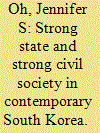

|
|
|
|
|
| Publication |
2012.
|
| Summary/Abstract |
This article examines the impact of Korean civil society on politics since democratization. Weak mediating institutions prevent the systematic inclusion of societal actors in the policymaking process, pitting an increasingly strengthened civil society against the state. Consequently, Korean state-society relations continue to remain contentious, posing challenges to democratic governance.
|
|
|
|
|
|
|
|
|
|
|
|
|
|
|
|
| 20 |
ID:
191897
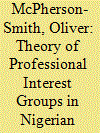

|
|
|
|
|
| Summary/Abstract |
Professional or industry-based interest groups have long been a feature of the Nigerian political landscape. Nevertheless, studies of these interest groups in Nigerian politics have largely privileged the analysis of individual groups or considered their collective role in the democratic transition of the 1990s. By returning the scholarly focus to their raison d’être, namely, their shared economic concerns, this article offers a comprehensive theory of interest groups in Nigerian politics. This novel theory posits that federal-level interest groups draw their membership from across Nigeria’s diverse ethnic, regional, and class constituencies due to their common economic concerns. Moreover, these groups actively lobby the federal government in pursuit of their economic advantage, often in direct competition with each other. Neither aloof from nor coopted by the state, the most prominent interest groups in Nigeria enjoy formalized positions within the bureaucracy from which to exert their influence and pursue the unique interests of their members. To develop this theory, this article employs new data and documents on the lobbying efforts of interest groups during the reform process of corporate law in Nigeria across a thirty-year period. Elite interviews, previously unpublished documents, and archival legal documents evidence their lobbying efforts. Examining the reform of corporate law across Nigeria’s later military regimes and the democratic Fourth Republic (1999–present) demonstrates the relevance of this theory of interest groups for both historical and contemporary understandings of Nigerian politics.
|
|
|
|
|
|
|
|
|
|
|
|
|
|
|
|
|
|
|
|
|